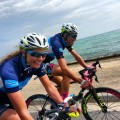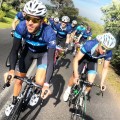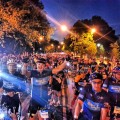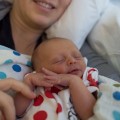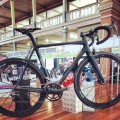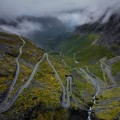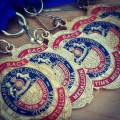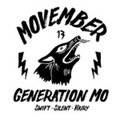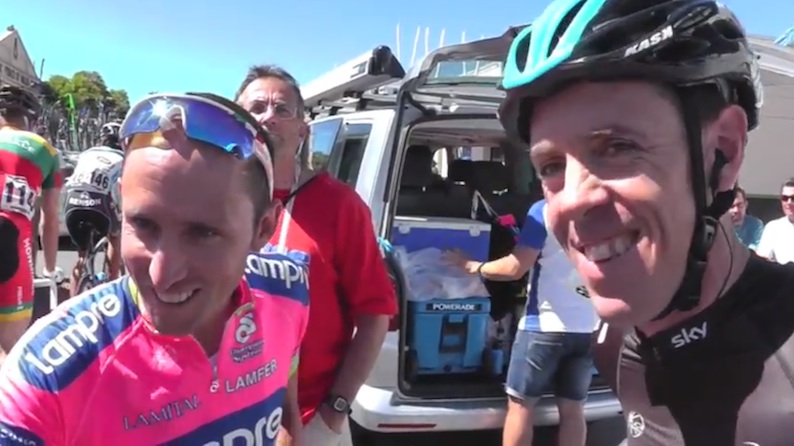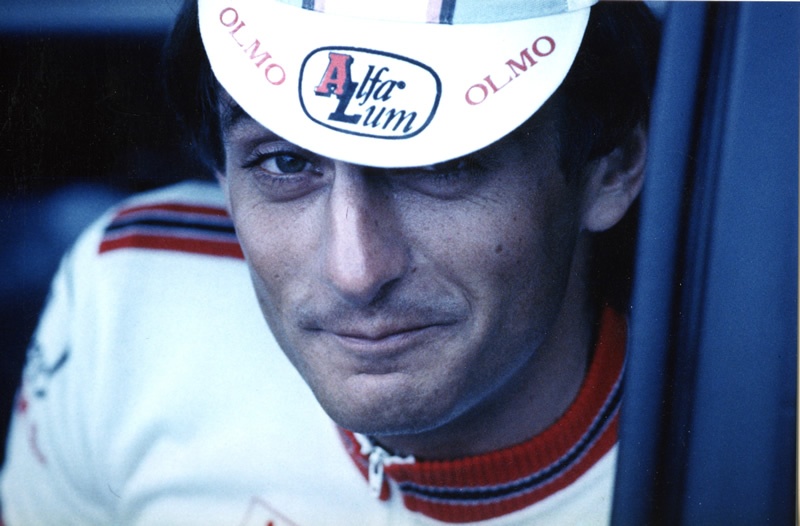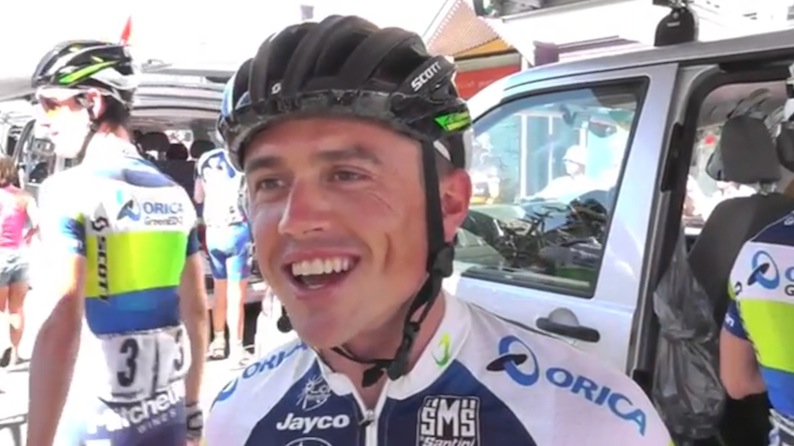[CT] What was going through your head as you rode your final race on Sunday?
[MW] I was trying to get in the moment a little bit and get nostalgic. I thought I’d have a lot of emotions but to be honest I didn’t feel anything at all. It just felt like a normal race except that everyone was congratulating me and wishing me well in the future. I don’t think it actually sunk in at all until the next day when I got up, jumped on a plane to the Vuelta as a staff member. Then I definitely felt sad about it all. Mixed emotions really.
So you’re already working the Vuelta?
In order to be a sports director you need a license to drive in the convoy. I’m basically here just to learn and spend a bit of time in the cars, doing recons of the stages, basically learning the job a little bit so I can hit the ground running [as a sports director] next year.
What’s it feel like being on the other side of the fence in Orica-GreenEDGE as a staff member instead of rider?
I only got here yesterday, but it definitely feels weird at this point. I thought it would be no different but all of a sudden I’m eating at the staff table and running to a different schedule than all the riders are. It’s all a bit bizarre at this point. Normally I’d room with someone like Cookie, or at this race would be Julian Dean. Now I’m rooming with Dan Jones who does all the Backstage Pass stuff. [CT: Staff and team members are always kept separate at the dinner table and with room sharing]
What did you do to celebrate once you finished your last race?
It was disappointing what happened. We planned a big dinner at a nice restaurant and everything, but at 40k to go we lost two guys to a crash. Gossy punctured, Stuey and Impey crashed…I crossed the line then anti-doping control took me so I waited for two hours there. It couldn’t have been any more anticlimactic. We got back to the hotel and there were only three or four of us there and the rest were in the hospital. A few of us went out and had a dinner and a couple drinks and that was it. It wasn’t the send-off I was hoping for, but that’s how it goes sometimes [laughs].
Why did you pick Vattenfall Cyclassics as your final race and not some criterium like Noosa where a nice send-off would have been more of a certainty?
I made the call after the Tour of Swiss. My big goal for the year was the Tour de France and I never came into the form that I was looking for and didn’t make the team. I was trying to think of a good goal for the end of the season. The way my head was I was already starting to think about being a director and I knew that I had lost that 5% edge that I need. I’m not a guy with so much talent that I can float around and do my job. I need to be 110% or I’m pretty useless. I made the call that I couldn’t do it anymore and had to stop early. Whitey, Bannan and Neil all agreed and we decided to pick a race that I could do a good job in and that I’d have a bit of fun afterwards. Hamburg has always been a race like that then I’d go off to the Vuelta and learn about my new career.
You’ve mentioned that your body can no longer take the rigors of being a professional cyclist anymore. Has this been creeping up on you or has there been a nagging injury?
It’s definitely been a slow process. Up until I was into my fourth year pro I had never broken a bone before. After that I started breaking things. My hands and wrists have been broken several times and they were getting really bad. I had to take a lot of anti-inflammatories and painkillers just to be able to brake and hold the bars. In December I had a bad crash and hurt my back and that was requiring a lot of work all the time. When you’re starting to take anti-inflams just to get out of bed in the morning I began to question if it’s really worth all the damage I’m doing. If I crash on my back again am I going to end up paralysed? You start to realise at a certain age that it’s not really worth it anymore. I had to reassess and had a good opportunity to have a career long after cycling in something I may well be better suited to.
Is there anything left of your Hodgkin’s disease and radiation treatment you received in 1999?
As far as the cancer goes I’ve had no reoccurrences but I’ve had issues down the side of my neck where I had the radiation treatment. An imbalance of the muscles – the radiation basically ate away everything in there. I get some neck problems but there’s nothing left of the cancer.
From what I’ve heard via mutual friends of ours, you’ve always been very outwardly appreciative of being a pro cyclist instead of working a “real job”.
Absolutely. I battled away in the amateurs and it wasn’t really happening for me. When you’re a kid you think, “ah, it’s too hard”, and you start to doubt everything and think that things would be better working a real job. Then I came back to Australia and worked a real job and I realized how lucky I was as a cyclist, even though I wasn’t getting paid at the time. After that being a pro cyclist became a lot easier. You see a lot of the younger guys whinging about little things that are wrong, problems their having…only getting 5 pairs of Oakleys, complaining about it being an hours drive to the startline, or something silly…every little thing is a constant battle and I never had any of those issues when I turned pro. I was just happy to be there.
Can you pinpoint some of your most memorable moments in the past 12 years?
Winning the national titles [2004 on Bunninyong] and the Sun Tour were big moments for me, but I think the biggest moment that stands out in my mind is when I took the start of the Tour de France for the first time. When I was a kid that was the one thing I used to watch on SBS and the one thing that inspired me to be a cyclist. When I was a kid dreaming of it I never ever thought I’d get the chance to do it. That was the most emotional moment. I didn’t finish that Tour but the next time I did it I remember riding into Paris and seeing that Eiffel tower. It was really special.
The National Titles and the Sun Tour were definitely emotional times of my career. I never dreamed I’d get the chance to win those either. But they were more of a revelation that I was coming of age and that I had ability that I never thought I had. They weren’t like the Tour de France moments were though.
Who have been some of your biggest influences in your career?
Dave Sanders [VIS coach] and Shayne Bannan were some of my earliest role models and people who helped me out a lot. My mother is one of my biggest inspirations. Then guys like Baden [Cooke], Stuart O’Grady, and Brad McGee, I respect them so much and they’ve all helped me through my career in various ways.
You’ve mention how do you think the sport has changed with respect to how the younger guys race these days. What exactly has changed?
When I first started there was a big tradition where you listened to the older riders and they definitely had more say in what happened. If you dive bombed someone into a corner and almost knock someone off you’d have guys smacking you on the helmet and giving you a serve. You’d always be concerned about those things as a young rider which kept you in your place. It was still dangerous, there’d still be lots of crashes with guys carving you up in the corners into the final. But at the beginnings of the races and other times of the race there would be a level of mutual respect amongst the riders and that went as far as the unwritten rules in the races. The smaller races, which were just training races, they were a lot more controlled and safer. You could actually use them as training.
Now the newer riders will carve you up in the first corner of the race and box you out of the way with no reason and no apologies. I guess it’s that Generation-Y. They don’t seem concerned about the constraints of tradition and etiquette. It’s like that in the small races, in the big races and it’s just made things a whole lot edgier and nervous in the bunch.
Do you think the money involved today and UCI point structure could be part of this?
Definitely. The UCI has put some much emphasis on points now. If you score say 100 points you could be earning so much more than someone who doesn’t have that 100 points. In the old system there were still points awarded but it wasn’t crucial for the team to have those points in order to get a license. What you brought to the table was still rated, but now if a team is struggling for points and you don’t have any, you’re of no value. They’ll bring in a guy who might not be a good teammate or fit to the team but he’s got 100 points so he gets bought. Guys are not cutting each others throats to get a few points.
What would you change about the points structure?
I think a full overhaul of the points structure is needed. There have been various things thrown around. A system where points earned by riders are shared with the team. For example if Contador wins the Vuelta and scores 200 points for that, instead of those 200 points staying with him, maybe 100 of those points go to his teammates. Therefore his win is still worthwhile to his team. If a rider wins 500 points and then asks for €3M/year in his contract and the team can’t afford to keep him, the team is then left with no points. If those points are shared then the team still has part of their investment from that year as well as all the riders who worked for him.
This would also take out the inflated salaries and disparity between the high and low paid riders. You’ll have one guy on €3M, and another on €50K, and they’re racing along side each other and there’s barely any difference in talent between them. A new points system would help take the highs and lows out of the pay scale.
So when the UCI stated that salaries are on the rise and that the average has risen to €264,000. Is the salary disparity really that big?
Definitely. Just hearing that the UCI’s statement of the average wage made me realize how far it’s gone out because it’s no way is it representative of the wage of most riders. If you took ten of the highest paid riders out of the equation that average would drop by a huge amount.
All very interesting stuff, but I’m starting to get off-topic. Let’s get back to you and your career. What are some of the things you’re going to miss about professional racing?
I’ll really miss being part of a team that worked amazingly well together. Being on top of the pain and being in control of it with your mates is an amazing feeling. It honestly hasn’t happened that much in my career but when it does it’s the best thing in the world. When you’re competing and it all comes together it’s amazing. The camaraderie amongst the guys I’ll also miss. I’m sure I’ll be part of it in some way, but it won’t be the same when you’re not out there battling with the guys every day it brings you very close together.
Has finishing your career with GreenEDGE been the pinnacle of that camaraderie?
It’s definitely been the best team as far as that’s concerned. In other teams you can get small groups that are like this. In Garmin we had a good group that was like that. In the first two years of FdJ we had a good bunch of guys who really got on, but it was only 5 or 6 guys. In this team [GreenEDGE] there’s no one person who sticks out and no matter who we put into a race we’re all racing together. It’s pretty special.
What won’t you miss about professional cycling? What can you give away?
[laughs] I can give away the crashing, and I can give away the wet and cold days, the bit mountain days…pretty much 90% of it! That’s not entirely true. It’s just been the past few years as I’ve gotten older it’s gotten much harder. It seems to be 90% suffering and 10% good. The balance just seemed to be out.
Do you think you’ll always still ride? I see a lot of people quite pro cycling and never touch a bike again.
Oh for sure. I love riding my bike. Even when I made the decision to retire and I had a couple months until Hamburg I still rode every day, still met up with the boys. I still really enjoy it. I’m mostly looking forward to doing other sports. When I was pro cycling I would go shopping with my wife or whatever I do I’d be just exhausted and couldn’t do anything but ride my bike. I’m really looking forward to going to the gym, do some swimming, some running, and feeling fit and healthy and being able to do other activities.
What other types of things are you looking forward to doing that you couldn’t do in the past?
I’m gonna start doing a few triathlons actually. Running and swimming are my hard points [laughs] but I’ve been working on the swimming. But the running…I’ve never done any load bearing sports in my life and my knees and ankles blow up after 30mins of running.
If you hadn’t become a pro cyclist, what do you think you would have done for a career?
When I was younger I didn’t know what I wanted to do, but I knew I wanted to do something I was good at. I was talking to my mom about this the other day and asked her, “why was I so obsessed about finding something I was so good at when I was young?” I went through things on a weekly basis. Instruments, music, I remember being at school being desperate at finding something I was good at. If I wasn’t good at it I’d throw it away and be onto the next thing. Somehow I got onto cycling, which I wasn’t particularly good at either! But something about it I really like and decided this was the thing I was going to try to be good at. From that moment I never looked at anything else. So to answer your question, I don’t know. I never got the chance to find other interests. When I finally found cycling, that was all it was. I opted to do my year-12 at TAF because I only had to go to school three days a week so I could train more. I was a solid C- student and just got my high school certificate because I didn’t see the point in trying any harder that I had to because cycling was all I was interested in.
A typical cyclists mentality…just sit in.
Yeah, do the minimum!
Last question, what advice would you have for aspiring pro cyclists?
From my perspective and what I’ve seen in the sport, it’s not the most talented guys who make it. I’ve seen a million talented guys who have never gone anywhere. I think back to the talented guys when I was young, most of them were more talented than I was. Most of them decided to stop before they really began to bloom. Some of them just kept going and it would eventually happen. It was a case of keep trying, keep trying, and then eventually everyone around you gives up and you’re the last one still there.
I’m not sure that this is still the case now. I see a lot of young guys now who are talented but just don’t have the engine that some of the other guys do now. And they just can’t find a place. It’s become a sport of big engines now. Before you could be crafty, determined, and hard working and you could find your place in the sport. Now unless you have one of these massive engines the teams will recognize your talent, but they won’t take you. If you look at the young guys now with the big motors they come from the track and time trial backgrounds. I don’t know…that’s just a loose observation.
Well congratulations Matt on a wonderful career and we all wish you the best to you in the second chapter. [Something tells me he'll be good at this DS gig. One day in and he's already started off with a bang with Simon Clarke getting his first grand tour win!]
This DS game is easy.
— Matt Wilson (@MattWilson77) August 21, 2012
